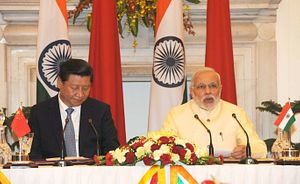The 11th G20 summit is scheduled to be held on September 4-5, in the picturesque city of Hangzhou, the capital of Zhejiang province, in China.
As the host country, which vested with the right to set the agenda for the summit, China has indicated to all the G20 members that the discussions at the summit will be confined only to issues relating to global economic growth and other financial issues.
In the past, some controversial geopolitical issues brought up during the course of summit had resulted in deviating from the main agenda. It is for this reason that the Chinese finance minister cautioned that member countries should limit their discussions to the matters listed in the agenda in order to arrive at a consensus on the global economic development. That applies to India as well.
Sino-Indian relations saw an upswing when Chinese President Xi Jinping visited India in 2014, and India’s prime minister, Narendra Modi, returned the visit in 2015. Both leaders agreed to focus on improving bilateral relations through commerce and trade. China agreed to partner with India in accelerating its economic development by investing in various infrastructural projects and also setting up manufacturing facilities in India. It is to the credit of the leaders of both countries that they have kept the complex border disputes on the backburner by agreeing to negotiate to find a mutually acceptable solution.
However, lately relations took a sudden turn for the worse when China blocked India’s membership to the Nuclear Suppliers Group. As if this was not enough, China also blocked India’s move to add Masood Azhar, the leader of the Pakistan-based Jaish-e-Mohammad terror group and the perpetrator of Mumbai attack which claimed over 160 lives in 2008, to the UN proscribed terrorist list.
In order to dispel any misunderstanding that has arisen about China’s stance over NSG membership, Chinese Foreign Minister Wang Yi was recently in India recently and conveyed to the Indian government that India’s membership in NSG is not a closed issue. In other words, China is open to considering India’s membership. Wang Yi’s visit came from the back of increasing pressure on India by the United States to support the Permanent Court of Arbitration ruling against China over the South China Sea dispute.
India, so far, has not accepted the U.S. overtures, but if China continues to act against India’s interests, New Delhi will be left with no option but to support the United States. It is increasingly perceived in India that the Chinese attempt to block India’s NSG membership is part of a larger design to limit India’s growing influence at the world stage. Although it is not in India’s interests to take sides, as nothing good will be achieved by antagonizing China, at the same time China also should realize that acting against India will only force the Asian power in the arms of the United States.
The G20 Summit provides a chance for a much needed reset for the Sino-Indian relationship, allowing them to focus on common goals. India and China have an obligation to help poor and developing countries usher in economic reforms by partnering with them in development projects. The two countries must also unite to combat climate change and reduce the wide gaps between developing and developed countries.
In addition to the G20, they should exert influence through BRICS, bringing more representation into international institutions and global economic governance. After the establishment of the New Development Bank and the Asian Infrastructure Investment Bank, BRICS is now in a far better position to put pressure on the International Monetary Fund and the World Bank to give the BRICS countries — Brazil, Russia, India, China, and South Africa — more role, representation and voice in the functioning of Bretton Woods institutions.
Modi, who is expected to meet Xi on the sidelines of the G20 summit, can express India’s concerns over China’s role in blocking India’s membership to NSG and in scuttling a UN ban on the terror outfit operating from Pakistan. It is hoped that both the leaders will show maturity in addressing complex issues, including the border dispute, and work toward closer cooperation in the interests of the people of both countries.
India should play an active role in ensuring the success of the G20 summit, and should make every effort to resolve the differences with its neighbor so that the bilateral relationship is taken to the next level. For China’s part, it should engage with all players involved in both the East and South China Sea disputes in finding a solution acceptable to all. When it comes to relations with India, it should support India on the global stage, as any negative tactics, force India to align with US, which would not be in its interest.
K.S. Venkatachalam is an independent columnist and political commentator. His articles have been featured in many leading newspapers.

































